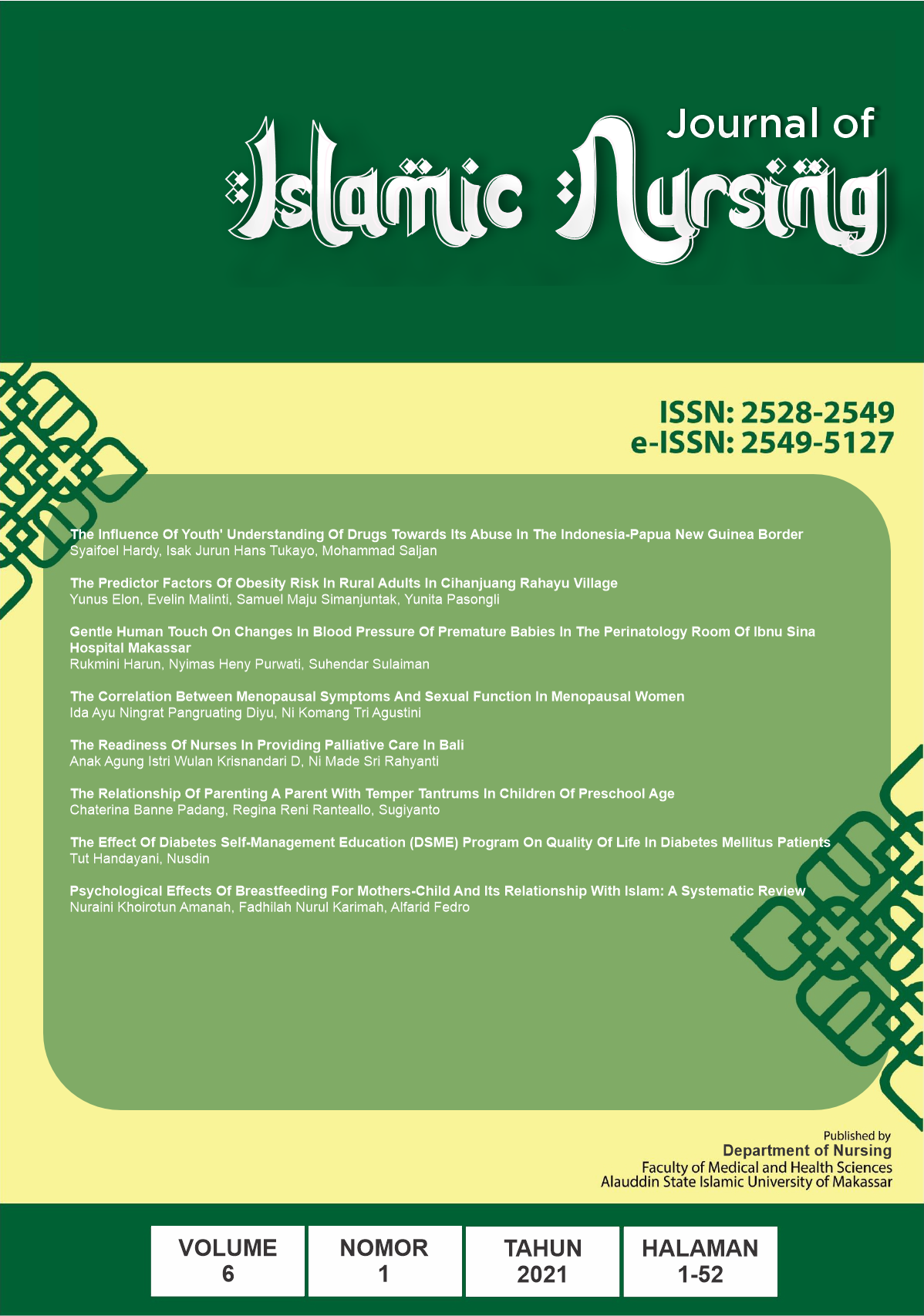THE READINESS OF NURSES IN PROVIDING PALLIATIVE CARE IN BALI
Abstract
The number of palliative care increases over time. Nurses have the biggest regulations in providing palliative care, because of that the readiness of nurses is an important thing in a palliative care setting. This study aimed to determine the readiness of nurses in providing palliative care. This research design was descriptive with cross sectional approach. There were four variables measured in this study such as knowledge, capability, willingness, and resilience of nurses in providing palliative care. The questionnaires were used in data collection. The number of samples in this study were 375 nurses. Tthe results showed that nurses still had less and varied knowledge about palliative care (median 9; variant 6.4). In this study, it was also found that nurses had the capability (median 6; variant 5.5), willingness (median 5; variant 0.8) and resilience (median 3; variant 0.5) in providing palliative care. The readiness of nurses in providing palliative care must be well prepared to improved quality and quantity of palliative care.
Keywords: Readiness, Nurses, Palliative Care
Downloads
References
Ablett, J & Jones, R. (2007). Resilience and well-being in palliative care staff: A qualitative study of hospice nurses’s experience. Psycho-Oncology, 16: 733-740.
Agustini, Nursalam, Rismawan, & Faridah. (2020). Undergraduate nursing student’s knowledge, attitude and practice toward palliative care in Indonesia: A cross-sectional online survey. International Journal of Psychosocial Rehabilitation, Vol.24, Issue 7.
Alshaikh, Z., Alkhodari, M., Sormunen, T., & Hillerås, P. (2015). Nurses’s knowledge about palliative care in an intensive care unit in Saudi Arabia. Middle East Journal of Nursing, 9(1): 7-13.
Anila, G. & Haseena, T. (2015). Knowledge and attitude of staff nurses regarding palliative care. International Journal of Science and Research (IJSR), 4(11), pp.1790-1794.
Chan, H., Chun, G., Man, C., & Leung, E. (2018). Staff preparedness for providing palliative and end-of-life care in long-term care homes: Instrument development and validation. Geriatrics & Gerontology International, 18(5), pp.745-749.
Departemen of Health Western Australia. (2017). Advance Care Planning: A Patient’s Guide. Perth: WA Cancer and Palliative Care Network.
Dyer , J & McGuinness. (1996). Resilience: analysis of the concept. Archives of Psychiatric Nursing, 10 (5):276–282.
Ferrell, B., Connor, S. R., Cordes, A., Dahlin, C. M., Fine, P., Hutton, N., ….Zuroski, K. (2007). The national agenda for quality palliative care: The national consensus project and the national quality forum. J Pain Symptom Manage, 33: 737–744
Giarti, A. 2018. Gambaran pengetahuan perawat tentang perawatan paliatif pada pasien kanker di RSUD DR. Moewardi (Skripsi). Universitas Muhammadiyah Surakarta.
Herbert, K., Moore, H., & Rooney, J. (2011). The nurse advocate in end-of-life care. The Ochsner Journal, 11 (4): 325-329
Hertanti, N.S. (2018). Palliative care knowledge and attitudes among primary care health professionals in Yogyakarta, Indonesia (Unpublished master’s thesis). National Cheng Kung University, Taiwan.
Kim, S & Hwang, W. (2014). Palliative care for those with hearth failure: Nurses’s knowledge, attitude, and preparedness to practice. European Journal of Cardiovascular Nursing, 201X, Vol XX (X), 1-10.
Kementerian Kesehatan Republik Indonesia. (2007). Kebijakan Perawatan Paliatif. Disitasi dari http://pdk3mi.org/file/download/KMK%20No.%20812%20Th%202007%20ttg%20Kebijakan%20paliatif.pdf
LeBlanc, T. W., Roeland, E. J., & El-Jawahri, A. (2017). Early palliative care for patients with hematologic malignancies: Is it really so difficult to achieve?. Current Hematologic Malignancy Reports, 12(4): 300–308. doi:10.1007/s11899-017-0392-z
Robinson, J., Gott, M., Gardiner, C., & Ingleton, C. (2017). Specialist palliative care nursing and the philosophy of palliative care: a critical discussion. International Journal of Palliative Nursing, 23(7), 352–358. doi:10.12968/ijpn.2017.23.7.352
Sorifa, B & Mosphea, K. (2015). Knowledge and practice of staff nurses on palliative care. IJHRMLP, Vol: 01 No: 02.
WHO. (2017). Definitiion of Palliative Care. Disitasi dari https://www.who.int/health-topics/palliative-care
WHO. (2018). Palliative Care. Disitasi dari https://www.who.int/news-room/fact-sheets/detail/palliative-care
Wulandari, F. (2012). Hubungan tingkat pengetahuan perawat tentang perawatan paliatif dengan sikap terhadap penatalaksanaan pasien dalam perawatan paliatif di rs dr. moewardi surakarta. Naskah Publikasi. Fakultas Ilmu Kesehatan. Universitas Muhammadiyah Surakarta http://v2.eprints.ums.ac.id/archive/21972/


